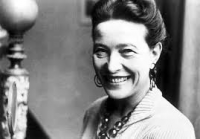Simone de Beauvoir
Contents
[hide]Country
France
Birth - Death
1908 - 1986
Occupation
Philosopher
Description
A noted writer, philosopher, and political activist, Simone de Beauvoir had a profound influence on the development of existentialism and feminist theory. Her output consisted mostly of novels and political commentary, but together they transposed into a philosophical theory about contemporary women’s rights. This formed the basis of feminism around the world.
As a stubborn and independent youth, de Beauvoir specialized in the unusual (for women) field of mathematics and philosophy. She taught philosophy in schools from 1931 to 1946. At this early age, she met fellow philosopher Jean-Paul Sartre and they entered into a life-long scholarly relationship.
This relationship would prove important to de Beauvoir’s development of feminist ideals on a number of fronts. In these early years, de Beauvoir had a habit of seducing young female students and then sharing them sexually with Sartre. Her first novel, She Came to Stay (1943), is a fictionalized chronicle of such a ménage-a-trois. Further novels would follow which also included explorations of such love and its attendant effects on the characters.
Sartre and de Beauvoir worked together on the development of existentialism, a theory in which existence precedes essence and wherein one adopts characteristics throughout life rather than inheriting them at birth. For women and feminist theory, then, the development of women’s rights would come only through life’s actions and interactions by women themselves. Born equal to men, women would have to transcend themselves to the level at which they are superior in any situation, and the responsibility for such would rely on their actions to achieve this end.
This argument was presented most clearly in de Beauvoir’s path breaking work The Second Sex (1949) published in two volumes. In this book, men’s role in relation to women was described as reinforcing stereotypes that placed women in an inferior position in order to organize society such that men hold primary power. Gender roles were thus a social contract, and women could change this by actively engaging in fights for their rights and relative power position.
De Beauvoir continued to write mostly fiction books and short stories that expanded on this philosophical theory through the use of storytelling. An example of this was The Mandarins (1954, Prix Goncourt). She remained active in the women’s liberation movement on a global basis and became its icon.
Simone de Beauvoir’s same-sex relationships were explicitly detailed in her autobiography and journals published in 1990. These relationships were clearly intense and sexual and formed the basis of her novels, although the extent of this, especially regarding the relationship with Sartre, was not known at the time of their publication. For example, we know now that de Beauvoir’s teaching job was terminated based on a complaint of sexual harassment of a female student. The last few years of her life were spent with her partner Sylvie le Bon.
It has been argued that the chapter ‘The Lesbian’ in Volume II of The Second Sex was the first serious philosophical treatment of lesbianism ever published. In this chapter, de Beauvoir discusses a women’s natural predilection to same-sex desire, though such is clearly shown as a choice in an existentialist concept of an adopted attitude.
For a long time, de Beauvoir was excluded from public discussion on lesbianism, but that has recently changed. The Simone de Beauvoir Institute at Concordia University, for example, is dedicated to studying feminism as it relates to issues of social justice.
Simone de Beauvoir carefully constructed her feminist arguments out of her life experiences, both with Sartre and others. At the time, she presented a shocking explanation of a woman’s role in society. However, she also provided a path to change that has been followed ever since. This is where her significant contribution to feminism, and also to LGBTQ rights, lies.

